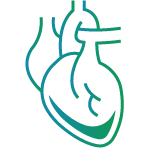
Heart Tests
The heart is a little organ that circulates blood throughout your body. It is the main organ of your circulatory system. Electrical impulses propel four major sections (chambers) of your heart. Understanding your risk, making healthy choices, and making efforts to lower your chances of having heart disease are all part of living a heart-healthy lifestyle. Adopting preventive actions can reduce your risk of heart disease.
Your doctor or physician may prescribe standard diagnostic tests to diagnose heart disorders after a health check-up. Specific heart tests offered include the Lipid profile, Cardiac screen panels, Cardiac injury profiles (mini & maxi), Cardiac risk profile, Heart failure profile Maxi, and Atherosclerosis profiles 1, 2 & 3.
- Tests: 14
When Are The Heart Tests Prescribed??
Knowing your pulse allows your doctor to assess the strength of your blood flow and blood pressure in various places of your body. In the case of asymptomatic patients below 40 years and with a blood pressure less than 120/80 mm Hg, the blood pressure should be monitored at least every two years, cholesterol levels should be checked every four to six years and blood sugar levels should be checked every 2-3 years especially if there is a positive family history.
The testing may be required more frequently if you are at high risk of heart disease or stroke. For this, weight and BMI are measured at routine annual checkups. Blood pressure and cholesterol checks should ideally begin at the age of 20.
Why Are Heart Tests Important?
It allows your doctor to see if there are any abnormalities with your heart's valves or chambers, as well as how well your heart pumps blood. If you do have heart disease, it is critical to seek treatment as soon as possible. Blood testing and heart health tests can aid in the detection of heart disorders as well as the identification of abnormalities that may lead to heart disease. There are various sorts of heart health testing.
Managing health risk factors and behaviours such as blood glucose, total cholesterol, blood pressure, body mass index (BMI), smoking, physical activity, or diet quality are essential components in lowering the risk of cardiovascular disease.
How Is The Heart Test Performed?
Most of the routine heart tests done are blood tests. The blood sample is taken from a vein in your arm using a small needle. After the needle is inserted, a small amount of blood will be collected into a test tube or vial. You may feel a little sting when the needle goes in or out. This usually takes less than five minutes.
If further testing is required, an ECG or a 2D Echo scan may be done. A healthcare practitioner uses an ultrasound machine to make moving images of your heart to determine if you have difficulties with your heart's pumping function and to evaluate your heart valves.
Time Required For Heart Test Reports + Next Steps
After you Book Heart Tests Online and do the tests, the results are typically sent to you within 24 hours. If the test results are normal with persistent physical discomfort, your doctor will recommend further testing to determine what else is causing you discomfort. You may need to see a cardiologist, depending on the severity of these irregularities. The results of the cardiac test will be discussed with you by your doctor.?
Depending on the outcome, one or more of the following strategies may be required:
-
There will be no changes to the current treatment plan
-
A different drug or medication dose
-
Diet and exercise routine modifications
-
New weight-loss objectives
-
Additional examinations
-
Follow-up sessions will be scheduled to check your health and treatment plan
Frequently Asked Questions
If you have a blood pressure monitor, you can measure your pulse rate and blood pressure. You can also watch for heart disease symptoms such as chest pain, pressure, discomfort, or tightness and immediately consult a health care provider for assistance regarding testing.
Back pain, stomach pain, heartburn, irregular heartbeat, left shoulder pain, chest discomfort, or shortness of breath are common early indicators of heart disease. A few others include constant fatigue, sleep apnea, lightheadedness or dizziness, sexual health issues, exhaustion or swollen feet.
Routine heart health checks and screenings should begin at 20, with most tests performed every 2 to 4 years. Such measures can frequently alert the patient and the doctor to any potential heart abnormalities before major health complications arise.
You will be instructed to fast (not eat or drink anything) after midnight the night before the test. 12-14 hours of fasting may be required for specific tests. Sips of water are acceptable.
Before taking the ECG test, fasting is not required. However, it is recommended that you wear comfortable clothing for the ECG assay and not apply greasy or oily lotions/creams to your body because they may interfere with the test data.
Twenty-four hours before the test, do not smoke or consume any caffeine. No other special precautions are necessary. Before the test, ask your doctor if it is safe to continue taking all your prescription and over-the-counter medications.
The cost of heart tests depends on whether individual tests or profile tests are performed. Region-wise pricing variations also occur.
You can Book a Heart Test using the website or phone number of Metropolis Healthcare.


